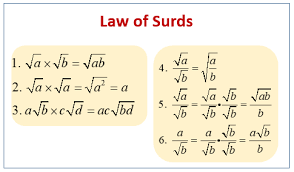

Surds are those irrational numbers that you can not represent as recurring decimal numbers or fractions. Meaning you can only represent them as square roots.
For more understanding of surds, it’s better we know the origin of the name. Surd is a Latin meaning of deaf or mute. Back then, the Arabian mathematicians were known to classify any rational number or irrational number as audible and inaudible. And since surds are made of irrational numbers, they were known as deaf or dumb in the Arabic language but as time went they were translated in Latin as surds.
Having explained that, in this class, we are going to learn the following;
- What are surds?
- Types of surds
- Basic rules of surds
Let’s dive in.
What are Surds?
Surd is used to refer to a number that does not have a root.
For example, the following have roots as their answers: √4, √25.
But these surds do not have proper roots: √6, ³√2, and √20.
Types of Surds
- Pure Surds: This type of surd had a single irrational number.
For example; √7, ⁴√11.
- Mixed Surds: This surd is a combination of a rational number and an irrational number.
For example; x√y, 8√5.
- Compound Surds: This type of surd is composed of two surds.
For example; 4+√3, √5+√2
What are the Basic Rules of Surds?
The basic rules of surds include the following:
- They cannot be added.
√c + √d ≠ √(c + d)
- You cannot subtract surds.
√c – √d ≠ √(c – d)
- Surds can be multiplied.
√c × √d = √(c × d)
- Surds can be divided.
- You can write surds in exponential form.
√c = c√½
Thank you for staying till the end. Gradely provides your child with the best online platform; where they will be taught complicated topics into simple points that are easy for them to learn. We have experts on maths at Gradely who can explain the topics of surds and provide extra resources for your kid to have a clear understanding. You can find a lot of materials associated with surds and any other topics like past questions, tutorials, etc. To get this benefit, register here and you get to talk with one of our tutors.
Share Post:
Gloria Elendu
Writer/Educationist
Get our latest articles in your inbox. Sign up for email alerts.


